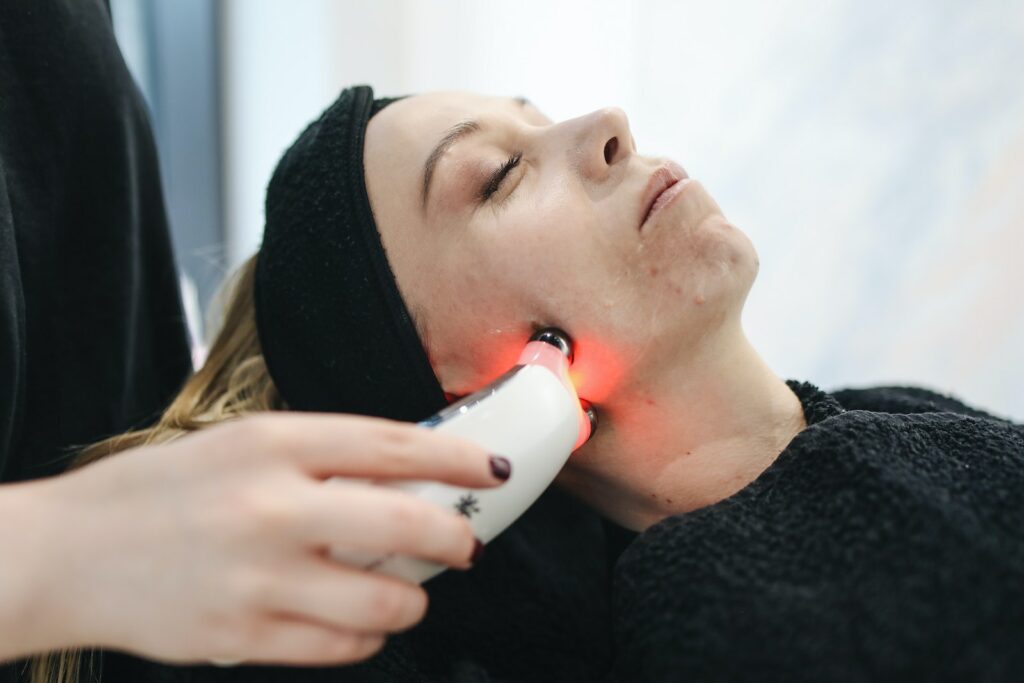
Tech Transformations in Skincare
As we venture into the futuristic world of 2024, technology continues to revolutionize various aspects of our lives, including the realm of skincare. Pioneering advancements in artificial intelligence (AI), biotechnology, and personalized solutions are rapidly transforming the beauty industry, offering unprecedented opportunities for diverse and individualized approaches to address specific skin concerns.
These innovative strides in the skincare industry are not only enhancing the effectiveness of treatments and products, but also allowing consumers to engage with their own beauty journey on a deeply personal level. As technology progresses, the future of skincare promises even more exciting developments for improved skin health and overall well-being.
Understanding Future Glow: How Technology is Shaping Skincare
In recent years, technology has been playing a significant role in shaping the skincare industry. Various innovations and high-tech solutions are revolutionizing the way people take care of their skin, ultimately leading to more personalized and effective skincare routines.
One key aspect of technology influencing the skincare market is artificial intelligence (AI). AI-powered tools and apps have the ability to analyze a person’s skin condition, lifestyle, and environmental factors, providing highly tailored skincare recommendations. For instance, Beauty 3.0 by Perfect Corp utilizes deep learning and neural networks to recognize skin-related pictorial data, such as shapes, colors, and skin pixels, to deliver personalized beauty solutions.
In addition to AI, other innovative technologies are shaping the future of skincare. For example, at-home skincare devices have become more refined and sophisticated, enabling users to treat various skin concerns with ease. This has led to a heightened interest in at-home treatments, with face serums and exfoliators gaining popularity.
The growing influence of technology in the skincare sector will continue to drive innovation and offer consumers more personalized and effective skincare solutions. As the demand for high-tech skincare increases, companies and researchers will continue to explore new ways of utilizing technology to improve the overall skincare experience.
The Science-Driven Approach to Skincare
The science-driven approach to skincare focuses on understanding the underlying causes of various skin conditions and developing effective treatments based on this knowledge. This method puts a significant emphasis on research and development, driven by the goal of promoting long-term skin health.
One area where this approach has made a significant impact is in treating acne, a common skin condition that affects millions of people worldwide. By studying the factors that contribute to acne development, scientists have been able to create targeted treatments that address the root cause of the problem. As a result, people suffering from acne now have access to more effective and personalized skincare solutions.
Furthermore, the science-driven approach to skincare also takes into consideration the unique needs of individuals with different skin types and concerns. This has led to the development of customized skincare routines that cater specifically to the needs of each person. By using products designed to address their particular skin issues, individuals can achieve better skin health in the long run.
In addition to treating specific skin conditions, the science-driven approach also recognizes the importance of maintaining overall skin health. This includes developing products and routines that focus on prevention, protection, and nourishment. For instance, advancements in the understanding of sun damage have led to the creation of innovative sunscreens that provide superior protection against harmful UV rays.
Transformation of Ingredients
The skincare industry has undergone significant changes in recent years, driven by technological advancements and increased consumer demand for effective, safe, and sustainable products. This transformation is clearly reflected in the evolution of skincare ingredients, which now focus on better efficacy, safety, and environmental responsibility.
One notable trend is the rise of natural ingredients as an alternative to synthetic compounds. For example, the use of CBD has emerged as an elegant addition to the skincare world, addressing various skincare concerns while offering an eco-friendly and sustainable option.
Niacinamide, a form of vitamin B3, has become a popular skincare ingredient for its ability to improve skin elasticity, even out skin tone, and minimize the appearance of fine lines and wrinkles. Vitamin C is another powerful natural ingredient with potential benefits such as enhanced collagen production, reduced inflammation, and protection against sun damage. Both niacinamide and vitamin C demonstrate how natural ingredients can effectively address various skin concerns.
In addition to natural ingredients, modern skincare products emphasize the use of potent molecules like retinol, hyaluronic acid, and ceramides. Retinol is a derivative of vitamin A and has been recognized for its anti-aging effects, including reducing the appearance of fine lines, wrinkles, and dark spots. Hyaluronic acid is a naturally occurring substance in the body that helps maintain skin hydration and elasticity. Incorporating hyaluronic acid in skincare products can improve overall skin texture and appearance.
Ceramides and essential fatty acids play vital roles in maintaining the skin’s lipid barrier. These compounds work synergistically to protect the skin from moisture loss and environmental aggressors while promoting a healthy balance of nutrients and hydration. The use of ceramides and essential fatty acids in skincare formulations helps to maintain the skin’s natural barrier function and promote long-term skin health.
The transformation of skincare ingredients is a testament to the power of technology and innovation in the industry. The strategic use of ingredients such as retinol, niacinamide, natural ingredients, and molecules like hyaluronic acid, vitamin C, ceramides, and essential fatty acids in skincare products offers a promising future where skincare can effectively address various concerns while prioritizing consumer safety and environmental sustainability.
At-Home Treatments and Devices
The pandemic has led to a significant increase in the popularity of at-home treatments, as people are looking to maintain their skincare routines without access to professional services. A variety of innovative, tech-driven skincare devices have emerged, providing efficient and affordable solutions for those seeking to achieve professional-grade results in the comfort of their own homes.
One such device gaining attention is the ATP-powered cold laser. These cold lasers utilize adenosine triphosphate (ATP) to stimulate collagen production, promote cell rejuvenation, and combat signs of aging. Traditionally used in clinics, these cold lasers have been adapted into smaller, more portable versions perfect for at-home use.
Microneedling radiofrequency treatments are also becoming more accessible for home use. These devices combine microneedling, a process that involves creating micro-injuries in the skin to stimulate collagen production, with radiofrequency energy which tightens the skin and reduces the appearance of fine lines and wrinkles. Compact and easy-to-use variations of this technology are now available for those looking to incorporate it into their skincare routines.
In addition to these treatments, there are numerous other at-home devices on the market that help address various skin concerns. Some of these tools include LED light therapy masks, which use various wavelengths of light to reduce inflammation, acne, and the signs of aging. And microcurrent devices, which provide a gentle electrical stimulation to promote collagen production and improve skin elasticity.
Overall, technology has played a significant role in revolutionizing the skincare industry, making at-home treatments and devices more effective, convenient, and accessible for individuals who wish to maintain their skincare regimen during these unprecedented times. As a result, users can now achieve the benefits of professional-grade treatments without leaving the comfort of their homes.
Skin Health and Protection
In the rapidly evolving world of skincare, technology plays a significant role in addressing skin health and protection. Advanced research and innovative tools strive to provide personalized solutions, taking into consideration various aspects such as SPF, sunscreen, and environmental factors.
In addition to sunscreen products, technology is now being utilized for skin diagnostics and recommendations. Artificial Intelligence (AI) and machine learning have found their way into the beauty industry, enabling skincare brands to develop personalized solutions for their customers. AI-driven skin diagnostic tools analyze individual skin concerns and offer personalized skincare regimens, ensuring that each user receives the most effective products for their specific skin types and issues.
While technology has revolutionized skincare, it’s crucial to address that AI programs may sometimes miss underlying causes of skin health. The focus should be on creating targeted solutions rather than marketing-driven recommendations. Skincare brands must strike a balance between utilizing technology and understanding human skin behavior to ensure the overall well-being of their users.
To summarize, technology and innovation are shaping the future of skincare, with advanced sunscreen formulations, AI-driven diagnostics, and personalized solutions becoming increasingly prominent. As the industry continues to embrace these advancements, it is vital to prioritize skin health and protection while harnessing technology in the most effective and responsible manner.
The Future of Skincare
In the ever-evolving world of beauty and skincare, technology is playing a pivotal role in revolutionizing the industry. A key trend in the future of skincare is the rise of personalized solutions tailored to individual needs, taking into account various factors like skin type, lifestyle, and environmental influences.
The skinification of beauty has redefined the way people approach skincare, emphasizing the importance of understanding and catering to unique skin types and concerns. This movement has led to a focus on barrier repair and skin barrier function, ensuring that the skin is healthy and resilient against external stressors.
One innovation transforming skincare is the integration of AI-powered tools and apps that can analyze a person’s skin condition, lifestyle, and environmental factors. These tools assist in developing customized skincare routines to target specific concerns and maintain optimal skin health.
Microbiome research has also emerged as a driving force in skincare innovation. As scientists uncover more about the complex ecosystem of microorganisms living on the skin, skincare brands have started to incorporate ingredients that support and maintain a healthy skin microbiome. This new understanding of the skin’s microbiome is revolutionizing how skincare products are formulated and marketed, with a shift towards incorporating probiotics, prebiotics, and postbiotics to achieve a diverse and balanced microbiome.
In summary, the future of skincare is shaped by technology, personalization, and an in-depth understanding of the skin’s unique needs and characteristics. As industry advancements continue to pave the way for innovative skincare solutions, consumers can confidently expect more targeted, effective, and customized products to tackle their skincare needs.
